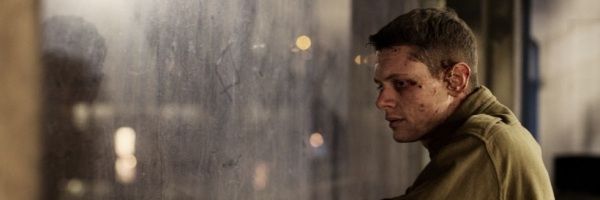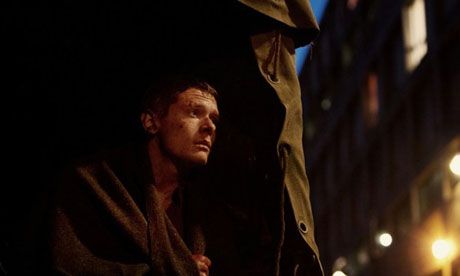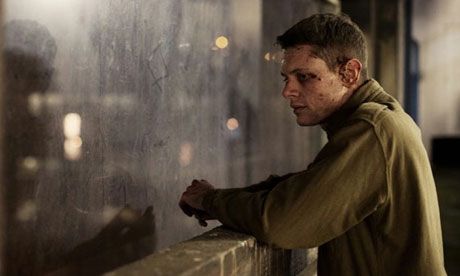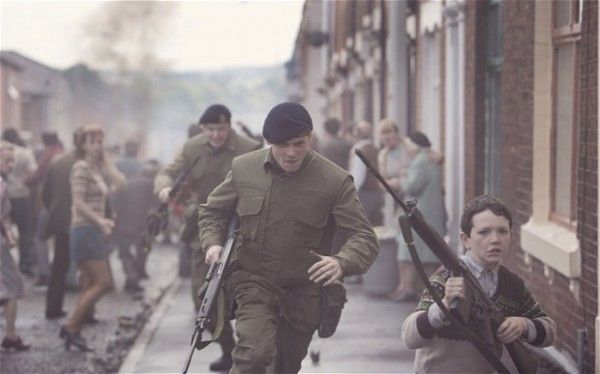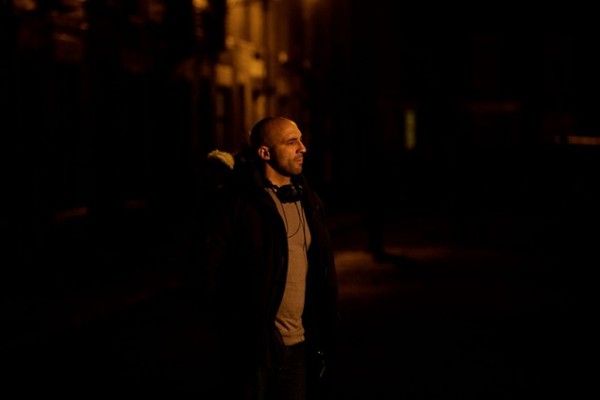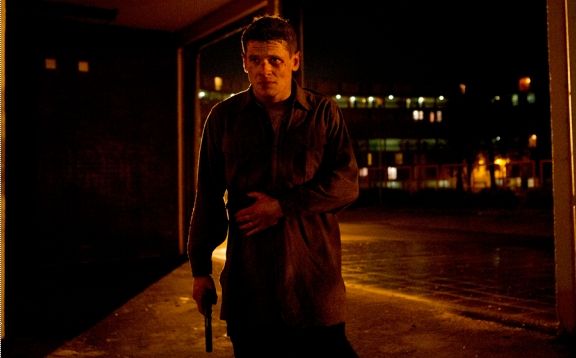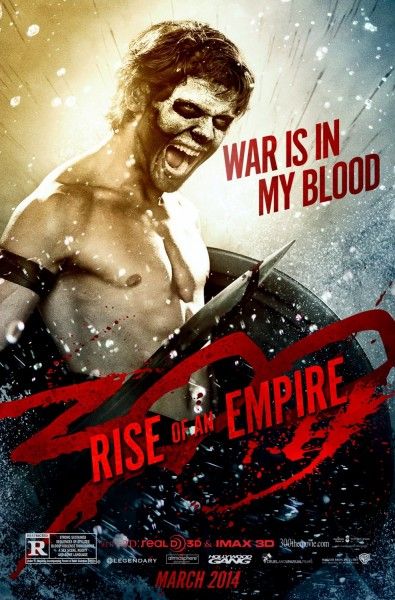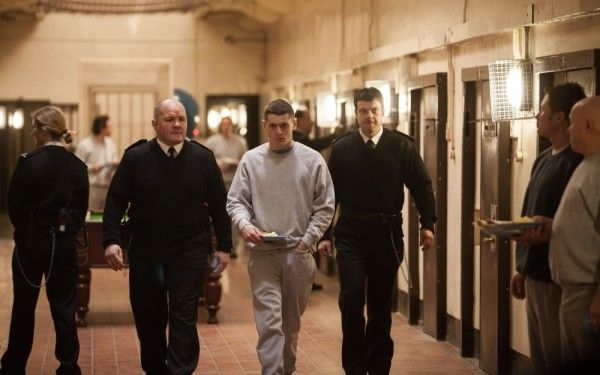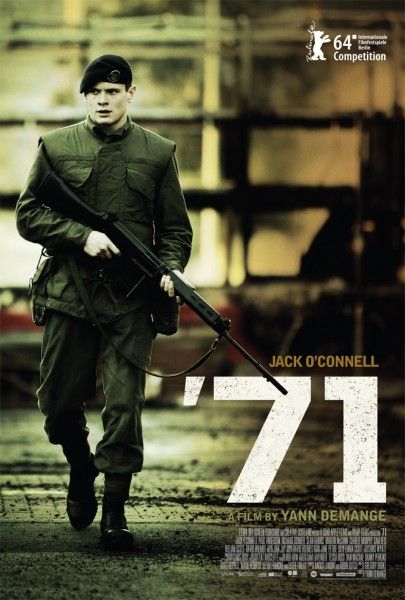One of the best films I saw at this year's Berlin Film Festival was '71, which is the feature directorial debut of Yann Demange (whose credits include some high-profile and acclaimed British television series like Top Boy, Criminal Justice, Secret Diary of a Call Girl). The film is set in Belfast in 1971 and it's about a young British soldier (Jack O'Connell ) that's accidentally abandoned by his unit following a riot. Trapped behind enemy lines, he's unable to tell friend from foe, and we follow as he tries to find his way home, while the locals battle for supremacy. One of the reasons the film is so powerful is that it doesn't portray any character or side in absolutes. Each person we meet along the way has depth, and Demange doesn't pull any punches when depicting the violence of the times. It's a great film that I hope finds domestic distribution.
While in Berlin, I was able to participate in a roundtable interview with Jack O'Connell. He talked about how he got involved in the project, how the film isn't just an action thriller, what he knew about the conflict prior to filming, the strong visuals of the film, how he got into acting, future projects like 300: Rise of an Empire and Angelina Jolie's Unbroken, and a lot more. Hit the jump for what he had to say.
Question: Was this one of these projects that you went after? Did it go after you? Talk a little bit about how you got involved.
O'CONNELL: Yeah thankfully Yann approached me at a time when I was already sort of booked so then Yann worked hard in trying to accommodate my schedule, because he wanted to tell a story through Gary's narrative so I guess he considered it imperative for me to be in a good state of mind for it. So I had two weeks in between finishing a role, an institutionalized role as a pretty fucked up prisoner, I had two weeks to kind of shake it off and try and adopt Gary to an extent.
How was that? I mean, two weeks is really quick.
O'CONNELL: Sometimes it's harder than others. I really walked with Eric, I feel, shooting in a prison in sequence order, yeah I really became him.
And you stayed in the prison while you were filming didn't you?
O'CONNELL: Nah, no no no, there was the option to, but it didn’t have air conditioning and we're talking about Belfast in February, so sod that.
With this, did you every toy with the army yourself?
O'CONNELL: Yeah, there was one stage where it looked like the only feasible way of making an honest living, yeah one stage of me life. Thankfully at that stage I was too young to actually sign the dotted line.
How old would you have been then?
O'CONNELL: Fifteen and by then I'd already done work experience at the army and completely idolized the whole structure. There is something quite admirable about the fold there, and the idea of physically bettering yourself, it's just a shame that it eventuates in conflict and heartbreak in one way or another.
You also wanted to be a football player so I think the physicality of the part was not a problem for you.
O'CONNELL: Oh, it’s still a problem, it's still a problem, on some days more than others, but thankfully I had preparation, which was throughout the majority of my childhood I always had a ball at my feet and I always exercised without knowing I was exercising so I guess I was in good condition. It definitely backed me up.
This is really putting you through your paces, you and the other guys as well, was that not just simulating but really making going out there?
O'CONNELL: Fucking right, I mean there's no way you can fake the suits without face replacement and we don’t have that sort of budget. And obviously we cut and I'm attentive as to whether we're going to go again or not, I find myself developing this instinct of knowing within a split second after we cut whether they're going to need another one just because of being more hopeful than anything, out of breath. So I probably run about four times distance of what you're actually seeing on screen yeah, but obviously we get the luxury of cutting and sitting down and shaking hands with my pursuers and there's no real death element, so that kind of takes the edge off.
Did you know much about the troubles and did you find it necessary to know? Because it's like Yann said, this could take place basically anywhere where there's a conflict.
O'CONNELL: I think that’s a real quality to the film as well, makes it definitely applicable globally I hope. I was first concerned with how little Yann knew about this particular history, but as you say it's so transferable. I perhaps knew more than Gary did, I would say, but that's got more to do with my heritage than anything else.
Have you got an Irish mother?
O'CONNELL: No, me old man was Kerry. Yeah, born in Kerry, moved over in the 60's and he's got a lot of siblings because he was Catholic and as you know they don't go to bed and read books, do they? So yeah, there was a very large Irish influence in my upbringing, one that I'm real proud of as well.
You get a lot of stories told to you about this?
O'CONNELL: No, it was all hidden. I had to educate myself on the topic. It was I guess part and parcel to the mentality at the time was just to not breed the hatred that they had been brought up on, very respectable.
From when you got the project to what people see on the screen, how much changed along the way?
O'CONNELL: It's always difficult, because I'm blissfully unaware of the end product while shooting the movie because it's always changing and I've just got to live it the best I can and not consider an audience perspective to a degree.
I was meaning maybe there was a certain story element that you were going to originally do, but then in the final release it was taken out or something that changed while you were filming.
O'CONNELL: As far as I know I think the original storyline eventually become the actual film itself. We didn’t shoot alternative endings or I didn’t see much cut that I can remember, but there was parts of the story that I didn’t want to know. I didn’t want to know what happened with the Boyle character and the politics within the IRA, which we display. I didn’t want to know about Armitage's story or his background. I didn’t want to know about the MRF section. I wanted to remain as perhaps unaware as Gary did, so there were certain elements of the movie that I was witnessing for the first time.
When you saw the film were you surprised by the visuals of the movie?
O'CONNELL: Yeah, well I think "surprised" is the wrong word because I had a lot of conviction for Tat [Radcliffe] as a cameraman, the OP, and I'd seen Matt's work. I was blown away by it but at the same time it made sense to me that Tat had created that. I think it's a beautifully shot piece and it's another one of the qualities of the film. I'm sure you guys agree, in terms of cinematography it definitely holds its head up high and it looks a lot more expensive than it was.
It's being billed in some places as a kind of action thriller and it has those elements to it, but it's not really an action movie in some ways, how do you see it?
O'CONNELL: Yeah, it kind of does flirt with that genre, but because it's set in a reality I'd hate for that in any way to desensitize it, and I think if it was an action thriller I'd hope it would still have the same genuine incentive, the one that we were trying to motivate ourselves with at the time. I've done a job similar before where unless there's a truthful element it’s kind of hard for me to appreciate, especially on paper. So I guess I have to get myself more equipped with fantasy-esque or thriller-esque movies where you're running around slaying robots for instance.
You have just done one big fancy movie though haven't you with 300?
O'CONNELL: Well I guess not, because that's again historical.
Well yeah, it's kind of in the way because it's very stylized.
O'CONNELL: And kind of mythical, which was apparent at the time also. Don’t get me wrong, I'm not writing it off. I like to keep an open mind with all areas of the job, but certainly for me, at this early stage anyway, the thing that resonates with me as an audience member is truth. Maybe that’s an imagination barrier of my own, but I think if we were to call it an action thriller I don’t think the film is being appreciated full if it's just going to be pigeon holed in the same sort of context as your shoot 'em up and where people are just getting slayed left, right and center and you feel no empathy. I feel that every murder on screen, every blow, every near miss its humanized. That's what gets me going as an actor, anyway.
Can you talk about the hardest part of playing that character. The director told me that he's a very naïve character in the beginning and that you’re more of masculine and aggressive guy and that you had to hold it back.
O'CONNELL: Sure, I mean maybe that’s because of where I came from, you know, trying to shake off this prison room that I was just in. It was very definite with Eric, he was quite well asserted in that regard whereas with Gary he's kind of internalized and that was risky for me. I felt lost a lot of the time, but then I'm glad the way that relates on camera too because it translates to me and my character was lost, very lost. So when I was trying to make decisions and affirm things very consistently Yann would try to pull me back.
Did you have a connection with the naivety from a period before or something?
O'CONNELL: I guess the main difference between myself and Gary is that I have an understanding of the backstory and the conflict itself more so than Gary did, and I'm probably more politically minded and historically informed than perhaps Gary himself. There were a lot of differences between him and myself, but I also knew the Gary that I wanted to play and that was one that was true to the generation that he was in, which is one that typically doesn’t ... I was just saying what's more typical to that era than mine is a real selflessness, a sort of subconscious state of mind to how you're feeling. They were genuinely more selfless, because they're parents were world wartime and they dealt with rations and more public community in that sense, and I consider that a real quality so when I can introduce that to my work I find it very educational personally. I definitely had issues with not knowing, not knowing where I was going, that was quite difficult.
I'm curious what it's like for you right now. You've been going from cool project to cool project, are you someone who can just audition the shit out of a scene? When you walk in the room are you just fantastic? Besides the fact that you're a really a good actor what do you attribute you being able to land these great roles time after time?
O'CONNELL: Well myself and Yann didn’t read anything thing before he offered me the job, so that was just an interview, and I don’t really have the luxury of choice that some people have come to expect and come to assume anyway. I'm not picking jobs out of an array of possibilities. I'm just trying to size up what's gettable at the time and I have to be reasonable with myself too. Thankfully nowadays I'm opening doors for myself and that was always the plan. I'd say I handle auditions quite well by now, I'd be quite worry if I didn’t. Also, I'd like to think that at the age of 23 I try to keep open minded and I try to engage with people free of stigma, and I think Yann appreciated that at the beginning. And I think from a directorial point of view it must be reassuring to know- like I don’t have preconceptions as an actor and I'm not a poser, I don’t feel vain, I'm not self-conscious in front of a camera and it's to a degree why I find Gary quite difficult, because there was a lot of consciousness to Gary. With acting there has to be a certain disregard for the camera too, as much as you've got to slightly favor it, the contradiction is that in your world as that character there is no camera, there is no sound person. So I don’t know maybe it is about my approach, I can't put all of it down to luck anyway, is what I'm trying to say.
Was the idea of the 300 movie just to give yourself exposure on a bigger scale?
O'CONNELL: Do you want to know the truth? I needed to pay bills, man and thankfully it came around. So typically a film like 300 isn't as character based as I would prefer, but also I want to be a diverse actor and one day I have every intention of being regarded as one of the best, particularly of my generation, so I need to equip myself with all these different qualities if I want to do that and I want to achieve a versatile approach.
One of the things about that role is that you had to really get yourself in shape, that’s what everyone did for those roles with 300 and the sequel, was that something that you were relishing to sort of put yourself to that physicality?
O'CONNELL: At first, but then the reality was very different than the fantasy that I had kind of preconceived prior to getting there. A lot of time spent in front of a mirror, more time than I'd ever feel comfortable with anyway. I was in a gym more than I was on set certainly, and when you're so far away from home even the trainers were feeling the schedule. So yeah, I'm reluctant to make too much comment on that. It definitely came with its own pressures and not pressures I'd welcome as an actor.
Have you finished the Angelina Jolie film?
O'CONNELL: Yeah, we wrapped on Tuesday.
How was that?
O'CONNELL: Probably in a singular context the biggest challenge of my career.
You're playing real guy so there's responsibility.
O'CONNELL: Yeah, still alive. He's 97 and still surprisingly lucid so I can't bank on the fact that he might not be able to gauge what's going on because he will, he will gauge. So we had to have my hair looking more or less looking good, because he prioritized his image once upon a time so there was a lot of emphasis on that too. Luckily I had someone like Angelina around who's kind of done it before, every adversity I was trying to face, she's done time and time again and I certainly grew and strengthened as an actor or a human. I'm 23 now so I'm playing these roles where I'm portraying youngsters that are becoming adults typically, and this was a real example of that, I don’t think you'll get a greater example of that actually.
Was she good at reassuring you if you were having these tough moments of doubt when you were playing the character was she good at focusing you through those?
O'CONNELL: I mean me as an individual what I really personally enjoy about certain people is selflessness, so if I was ever in doubt I would struggle to admit it so she was really good at sensing it as opposed to me having to go to her. In the end she promised me and made me promise her that it would be the best of both us and we're now reflecting on exactly that and that doesn’t just happen by arriving as scheduled. An awful lot went into it and I think as a result we're really sitting on something. I cant wait to promote it and hopefully I'll see it down the line.
One of the things that’s so exciting about that specific project is the script that Joel and Ethan Cohen contributed to. I don't know the final draft, but they wrote at least a draft of it, genius filmmakers how was the script? Was it the script that got you involved? Could you talk a little about about the story?
O'CONNELL: Yeah sure, I mean look, the story's no mystery. It was the opportunity to portray such a monumental human being who was true to life and is still alive now. It was that opportunity that made the job irresistible to me. To be at the age I'm at and to have a mature enough state of mind to be able to appreciate to the best I can quite selflessly, to be able to appreciate what he must have had to...at a similar age to myself, what he went through- sorry I've had a mental block. You asked me if the script was originally what attracted me. I mean it was certainly a feature to it, but I mean it's one of them that we have experts across the board we have experts on set. we have Roger Deakins shooting, Angelina Jolie has to bee one of the most empathetic actor/directors I've ever worked with, and we had a sterling cast, real sterling cast and the studio took a risk casting an unknown as their Louis so I really relished that opportunity.
So did Angelina vie for you then?
O'CONNELL: Yeah.
She must have done.
O'CONNELL: Yeah, yeah.
That's a bit of an accolade.
O'CONNELL: Well I have to remain grateful and it's no skin off my back to remind her of my gratitude on that level, but also if I do say so myself at the risk of sounding perhaps a little overconfident, I was ready for an opportunity like that. I can say that with total conviction now in hindsight as well, which is a blessing.
Do you feel like you built up to it with these others like this movie?
O'CONNELL: Exactly, it's all learning and what I've just done now hopefully builds on to the next one and so on and so froth, but to be in that position where I've been trusted to such a degree is a real credit to Angelina and her instinct, because you have so many influencers probably trying to tell her that it’s a bad idea and now from the feedback I've heard it's the total opposite opinion. I think we're all pleased with what we've done.
Do you still get back to Darby?
O'CONNELL: Yeah, up until this week I was still based there.
So where are you based now?
O'CONNELL: I just moved into London, East London.
But up until this week you'd go off to make a movie with Angelina Jolie and go back, what do your mates make of all that?
O'CONNELL: Thankfully I've known them long enough to detect any indecent, ingenuine sort of alteration in how they portray themselves to me, so they're all really super conscious of not seeming false to me because they know I'd pick up on it. Thankfully I've got my own ties there where I don’t feel at all vulnerable. It’s a very small city and none of these opportunities are ... it's not a hub for this kind of fortuitous ... but I'm not the only actor to hail from Darby all of the sudden, I'm very proud to say that, I've got a good friend of mine who's currently in Toronto working for HBO who I grew up with.
Who's that?
O'CONNELL: Michael Tucker. Two or three years above me, I remember I idolized him at school. We're pals.
I'm curious what you like as an actor, some actors prefer doing 2 or 3 takes and some people like the David Fincher method of 50 takes, they want to keep on doing it as many times as they can, what do you like?
O'CONNELL: I guess it all depends, man. Different contributing factors would alter my preference in that situation. For instance some things you want to get out of there, you want to do it and get out of there, sometimes you don’t have the schedule to emphasize a particular moment. But also, someone like Angelina she wont stick around and wallop the ass of it if there's no point. we were doing one takes left right and center for little bits and bobs. So as much as I like to consider myself a perfectionist there is such a thing as imperfection in real life and if we can introduce that into film than I'm all for it. I'd find 50 takes a pop very, very frustrating actually.
How did you find working with Sean Harris on this because he's mega intense.
O'CONNELL: I've worked with Sean before.
On what film?
O'CONNELL: Harry Brown. We were never directly in the same scene.
He's the man in that one as well.
O'CONNELL: He was, yeah. You know what? I honestly really respect Sean, because I don’t feel like I've ever met him. I've met the characters he's played. I've received abuse [laughs] from the characters he's played all in a professional and artistic context and if that’s the case then so be it man, I'm all for it and it's educational to see an actor like Sean. because it works, man whatever he did on screen with '71 I believed him. I really felt his character. He gave his character a name, he wasn’t originally named and he named him Sandy, and a whole backstory which I find fascinating. But yeah, educational but I think that’s pretty safe to say about every actor I've worked with. I've been very fortunate to find myself on set with real professionals and very talented individuals. I'm on an apprenticeship learning on the job so I'm all eyes and ears a lot of the time, especially characters like Sean.

